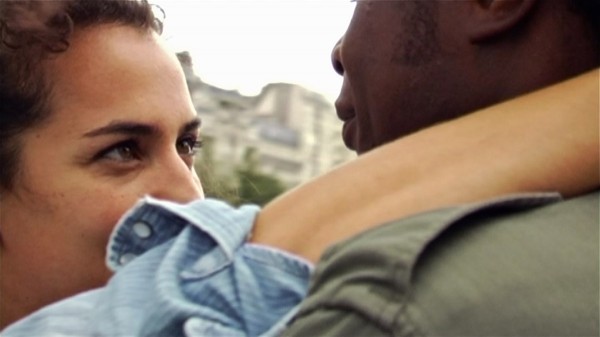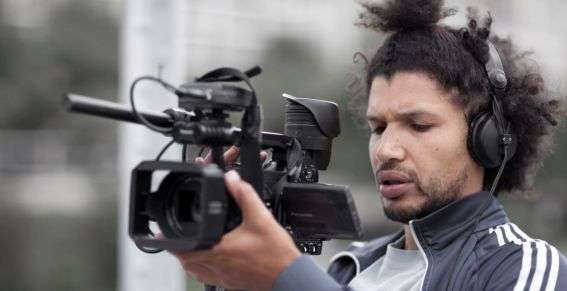 SABRINA HAMIDA AND STÉPHANE SOO MONGO IN RENGAINEWitty, inventive Parisian guerrilla ghetto movie
SABRINA HAMIDA AND STÉPHANE SOO MONGO IN RENGAINEWitty, inventive Parisian guerrilla ghetto movie In the first scene of
Rengaine ("Refrain"), a Parisian ghetto Romeo and Juliet story, black Christian struggling actor Dorcy (Stéphane Soo Mongo) and his girlfriend of one year, the Arab Muslim girl Sabrina (Sabrina Hamida), decide to get married. Sabrina's eldest brother Slimane (Slimane Dazi) learning of this promptly begins contacting the 39 “brothers” in their extended clan to prevent this taboo union. Just what the "39 brothers" means isn't specified; partly, it's a joke mocking tight all-male clans. And that turns out to be even more tongue-in-cheek when a missing older eldest brother turns up, who is gay. Eventually it turns out that Slimane himself secretly dates a Jewish singer called Nina (Nina Morato). Shot largely in the streets and somewhat on the run, this film is a rapid-fire series of very short vignettes, many of which are meant to surprise and amuse.
Rengaine is a celebration of the multicultural life of Paris's less posh neighborhoods and a mockery of old-fashioned ideas from traditional cultures lingering on in modern urban settings, specifically, the City of Light. What it lacks in polish the film makes up in inventiveness and promise.
"This film," says a festival blurb, "is part love letter to the irresistible energy of Paris, part call for interracial tolerance." Said to have been a nine-year project and bearing a French completion date of 2010, as its Allociné
page will show (it got a very high press rating of 4.0).
Rengaine, which means "Refrain" but whose English title is Hold
Back, is rapid-fire guerrilla filmmaking that plays with ideas and situations in an inventive way that brings to remind a similar recent product, Djinn Carrémard's
Donoma (ND/NF 2012). These films are remembered for certain moments and for their energy, and their value will come in how much they manage, if they do, to penetrate into and fertilize French mainstream filmmaking.
In the case of
Rengaine, the love story of Sabrina and Dorcy seems almost an afterthought at first. Many other scenes intervene, usually of Slimane meeting with a panoply of different "brothers," but also of Dorcy's uneven attempts to be an actor and at one point a singer, before enough scenes of the loving couple appear on screen to develop their relationship a bit. The notable thing about them is that they are neither young nor particularly pretty. Dorcy is mellow and a bit goofy. His motivation as an actor seems uncertain, though towards the end, in a deliberately deceptive sequence, he seems to be giving his all. Sabrina is a thoroughly modern lady, very firm in the lack of any need to justify her ecumenical affections to family members. But when Slimane expresses this notion to his Jewish girlfriend Nina to explain his unwillingness to introduce her to his mother or father or any other kin, the statements ring completely false. Of such ironies is the ingenious patchwork of
Rengaine composed.
Djaïdani partly uses the forty brothers idea to present a kaleidoscopic society of Arab men, not a single one of whom is old or bearded but who seem all other ages and all occupations. He doesn't actually photograph them with their occupational accoutrements, but one is reminded of August Sander's portraits. The undertone is to say that there can be no unanimity here, but that Slimane's conservative closed-mindedness to Sabrina's marrying "out" will no longer wash with the majority of them, not in Paris.
If this was made with "no money" as is reported that explains the fact that the cameras used are rudimentary, but the one negative element is that the images are very rough and jerky, absurdly so at times. It's out of keeping with the sophistication of the concept and the richness of the scenes otherwise.
The 38-year-old Rachid Djaïdani has a lively provenance. Of Mixed Algerian and Sudanese descent, he began as a production assistant on Matthieu Kassovitz's groundbreaking
Hate in 1995, then became famous as writer of a 1999 banlieue-set novel,
Boumkoeur, which became a bestseller (he now has three novels published by Éditions Seuil). He then was a TV and stage actor and for five years a member of Peter Brooks international touring company. On top of all that he's been a champion boxer. He previously made a 55-minute documentary called
Sur Ma Ligne (2006).
Rengaine (sometimes called
Hold Back in English) debuted at Cannes in 2012 as part of Directors' Fortnight. It won the FIPRESCI Prize there, and later the French César for Best First Film. It has showed at a series of other festivals, opening in Paris cinemas November 14 to very favorable reviews, as mentioned above. Screened for this review as a part of the Film Society of Lincoln Center's and MoMA's New Directors/New Films series in March 2013.
 RACHID DJAÏDANI
RACHID DJAÏDANIA French article on the filmmaker by Ollivier Pourriol, "Rachid Djaïdani : la révélation cannoise," appeared in
Marianne.





